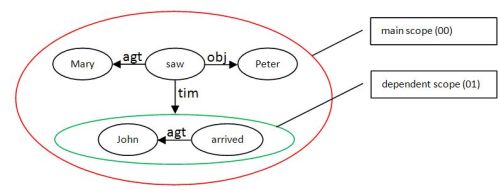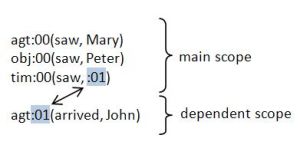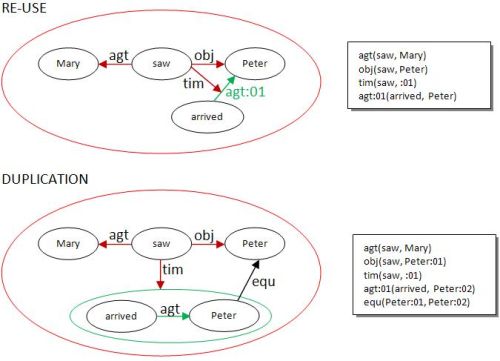Scope
The UNL representation is a hyper-graph, which means that it may consist of several interlinked or subordinate sub-graphs. These sub-graphs are represented as hyper-nodes and correspond roughly to the concept of dependent (subordinate) clauses, i.e., groups of words that consist of a subject (explicit or implied) and a predicate and which are embedded in a larger structure (the independent clause). They are used to define the boundaries between complex semantic entities being represented.
What is a scope
A scope is a group of relations between nodes that work as a single semantic entity in a UNL graph. For instance, in the sentence "Mary saw Peter when John arrived", the dependent clause "when John arrived" describes the argument of a time relation and, therefore, should be represented as a hyper-node (i.e., as a sub-graph) as indicated below:

In the UNL table representation, hyper-nodes are indexed by ":XX", where XX is a two-digit hyper-node index. The main node index is :00 and may be omitted. Hyper-node indexes must be associated to every relation inside the node.

When to use scopes
Scopes must be used to isolate dependent clauses:
- adverbial clauses:
- time: her father died [when she was young].
- condition: [If they lose weight during an illness], they soon regain it afterwards.
- purpose: They had to take some of his land [so that they could extend the churchyard].
- reason: I couldn't feel anger against him [because I liked him too much].
- consequence: My suitcase had become so damaged on the journey home [that the lid would not stay closed].
- concession: I used to read a lot [although I don't get much time for books now].
- place: He said he was happy [where he was].
- manner: I was never allowed to do things [the way I wanted to do them].
- adjective clauses:
- The vegetables [that people often leave uneaten] are usually the most nutritious.
- Chewing with her mouth open is one reason [why Fred cannot stand sitting across from his sister Melanie].
- nominal clauses:
- subjective: [Why you did that] is a mystery for me.
- subjective complement: You can be [whomever you want].
- objective: I know [that the weather will be very hot].
Scopes must also be used to prevent semantic ambiguities:
- electric [light orchestra], with scope, i.e., a "light orchestra" that is electric; or
- electric light orchestra, without scope, i.e., an orchestra that is both "light" and "electric".
When not to use scopes
- Scopes should not be used to isolate terms that do not form a semantic unity or that are not semantically ambiguous.
- Scopes may also be omitted in word-driven representations, i.e., in representations that focus on relations between words rather than on relations between clauses.
@entry
Every scope (including the main one) must have one and only one attribute @entry, to be assigned to the head of the scope. The head of the scope is:
- the main verb, in verbal predicates;
- the subject complement, in nominal predicates;
- the head of the phrase, in phrases and non-finite clauses.
Examples:
- her father died.@entry [when she was young.@entry].
- [If they lose.@entry weight during an illness], they soon regain.@entry it afterwards.
- They had to take.@entry some of his land [so that they could extend.@entry the churchyard].
- I couldn't feel.@entry anger against him [because I liked.@entry him too much].
- My suitcase had become so damaged.@entry on the journey home [that the lid would not stay closed.@entry].
- I used to read.@entry a lot [although I don't get.@entry much time for books now].
- He said.@entry [he was happy.@entry] [where he was.@entry].
- I was never allowed.@entry to do things [the way I wanted.@entry to do them].
- The vegetables [that people often leave.@entry uneaten] are usually the most nutritious.@entry.
- Chewing.@entry with her mouth open is one reason [why Fred cannot stand sitting.@entry across from his sister Melanie].
- [Why you did.@entry that] is a mystery.@entry for me.
- You can be [whomever you want.@entry].@entry.
- I know.@entry [that the weather will be very hot.@entry].
- electric light orchestra.@entry
Co-indexation
Nodes must be co-indexed when used in different scopes. There are two main co-indexation strategies:
- re-use, i.e., to use one single node as argument of relations in different scopes
- duplication, i.e., to duplicate nodes and to link them by the relation "equ"
Both strategies are illustrated below for the sentence "Mary saw Peter when he arrived"..
